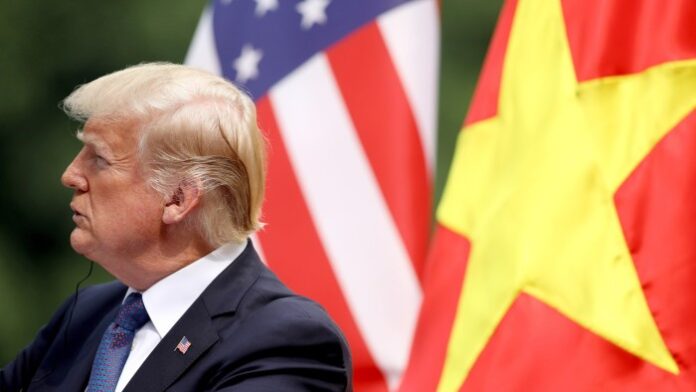Unlock the White House Watch newsletter for free
Your guide to what Trump’s second term means for Washington, business and the world
Donald Trump said the US had struck a trade agreement with Vietnam in a deal that would lower Washington’s “reciprocal tariff” on exports from the Asian country to 20 per cent.
The new tariff level represents a more than halving of the 46 per cent levy Trump initially imposed on Vietnam during his “liberation day” tariff blitz on April 2, but is higher than the 10 per cent rate it was lowered to for 90 days as trade talks took place.
The deal makes Hanoi one of the few capitals to reach a trade agreement with Washington in the past three months. But the steepness of the tariffs remaining in place could unnerve countries still hoping to secure significant relief from the levies announced in April, which triggered a financial market sell-off at the time and upended global trade.
Describing the deal as “something that they have never done”, Trump said in a Truth Social post on Wednesday detailing the agreement that Vietnam would give the US “TOTAL ACCESS” to their market and that “we will be able to sell our product into Vietnam at ZERO Tariff.”
The US will also charge Vietnam a 40 per cent tariff on “trans-shipping” as Washington seeks to crack down on businesses sending products made in China through other countries to avoid high levies on Chinese goods.
Vietnam’s official state media reported that Vietnam’s Communist party chief To Lam held a phone call with Trump on Tuesday and the two sides reached a consensus on a “fair and balanced reciprocal trade agreement framework”.
During the call, Trump “affirmed that the US will significantly reduce reciprocal tariffs on many Vietnamese exports”, state media reported, without referring to any specific tariff rates.
“The 20 per cent baseline tariff for Vietnamese imports is higher than expected, undoubtedly causing angst among other trading partners trying to finalise deals,” said Wendy Cutler, a former US trade official who now serves as vice-president at the Asia Society Policy Institute.
Hanoi, though, had a “strong interest” in reaching a deal with Washington given almost 30 per cent of Vietnam’s exports are destined for the US, Cutler said.
The south-east Asian country’s exports to the US have risen in recent years as manufacturers have moved production out of China to avoid US tariffs, with Vietnam hosting the likes of Apple, Samsung and Nike. In 2024, the US exported $13.1bn in goods to Vietnam, according to US government figures, but imported $136.6bn over the same period.
The Trump administration has accused Vietnam of being a conduit for Chinese exporters trying to avoid punitively high US tariffs on Beijing. The practice, known as trans-shipment, had become a critical issue in Hanoi’s negotiations with Washington.
Many companies assemble components manufactured in China in other countries including Vietnam and its south-east Asian peers, or add enough value to the products to legally change their place of origin. However, some merely relabel their products without any added value, a practice that is illegal but difficult to trace.
Markets broadly took the announcement in their stride. The dollar was down less than 0.1 per cent, extending a recent slide, while the S&P 500 climbed steadily through the day to finish at a record high.
Shares of several companies with significant manufacturing operations in Vietnam rose. On Wall Street, Nike climbed 4.1 per cent and toymakers Mattel and Hasbro each gained 1.6 per cent, while Adidas rose 1 per cent in Frankfurt.
The lower levies may offer some relief for Vietnam, but it is unclear how the two-tier tariff system announced by Trump would work. It is also unclear how Hanoi can trace trans-shipment and what percentage of its exports would be hit with the higher 40 per cent rate.
Alicia García-Herrero, chief Asia-Pacific economist at French investment bank Natixis, said the 20 per cent flat tariff was “not too bad” for Vietnam so long as US tariffs on China remained relatively higher.
“The question is whether there is any fine print — for example, Vietnam imposing tariffs on products and inputs imported from China which are vital to its manufacturing economy,” she said.
The deal with Vietnam comes a day after Trump threatened to increase levies on Japan, casting doubt that Washington would reach a deal with Tokyo.
Additional reporting by Peter Foster in London


